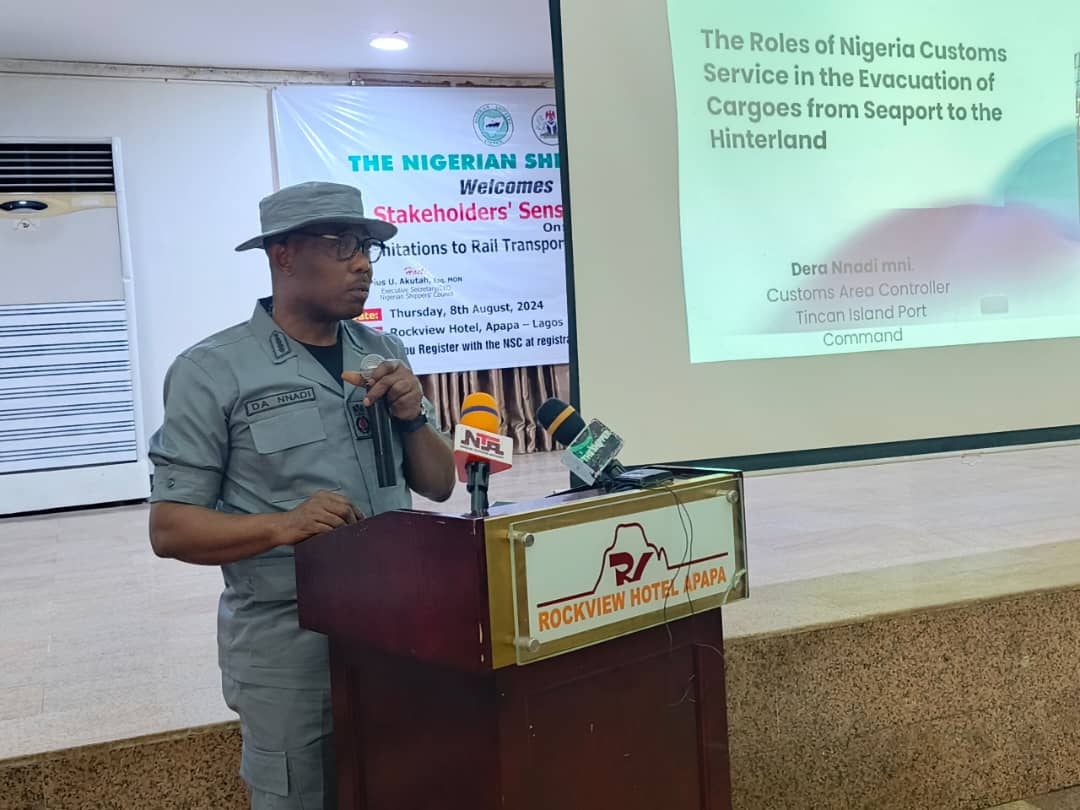Nigeria Customs Crucial in Evacuation of Cargoes from Seaports to Hinterland, Says TCIP Area Controller

The Customs Area Controller of Tin Can Island Port (TCIP), Da Nnadi, has outlined the pivotal roles played by the Nigeria Customs Service (NCS) in ensuring the efficient evacuation of cargoes from seaports to the hinterland.
In his paper titled “The Roles of Nigeria Customs Service in the Evacuation of Cargoes from Seaport to the Hinterland,” presented at a stakeholders’ sensitisation forum held in Apapa, Lagos, on Thursday, Nnadi emphasised the critical importance of decongesting seaports and highlighted the collaborative efforts required among terminal operators, logistics providers, and other stakeholders to optimise the process.
Nnadi explained that the seamless movement of cargoes from seaports is integral to Nigeria’s trade and logistics chain, with the NCS playing a central role.
According to him, the NCS not only clears and secures cargoes but also facilitates their efficient transport, thereby supporting the country’s broader economic objectives.
Nnadi identified the recognition and licensing of off-dock and inland container terminals as critical measures by the NCS, enabling the effective evacuation of goods from congested seaports.
He stressed the need for streamlined customs operations in clearance of cargoes to ensure swift movement, with NCS officers meticulously inspecting and verifying cargoes before they are transferred to bonded terminals and hinterlands.
The IM 8 import module is primarily used for cargo destined for these areas, ensuring that regulatory requirements are met, duties are collected, and goods are released in a timely manner.
Moreover, the introduction of programs such as the Fast Track and Authorized Economic Operators (AEO) initiatives, alongside the deployment of the Pre-Arrival Assessment Report (PAAR), has significantly eased the evacuation process.
Nnadi noted that the NCS has also introduced risk management techniques to identify and manage potential challenges associated with cargoes.
One notable initiative is the World Customs Organization Time Release Study, which aims to identify and eliminate bottlenecks in the clearance process.
This initiative aligns with the Nigeria Customs Service Act (NCSA) 2023 and global trade facilitation agreements, incorporating modern trends such as Non-Intrusive Inspections Technology and shipment tracking.
Nnadi further underscored the collaborative roles of various stakeholders in ensuring the efficient evacuation of cargoes. Bonded terminal operators, importers, exporters, shipping companies, freight forwarders, and logistics providers all have a role to play in this complex process.
He said bonded terminal operators, for instance, are responsible for managing port facilities, handling cargoes, and coordinating with the NCS to ensure smooth operations. The efficient management of these facilities is crucial to prevent delays and streamline the movement of goods.
Importers and exporters are also key players, responsible for ensuring accurate documentation, compliance with customs regulations, and effective coordination with logistics providers.
Similarly, shipping companies must adhere to schedules to avoid port congestion, maintain cargo security, and coordinate with port authorities to ensure the swift movement of goods.
Freight forwarders and logistics providers, on the other hand, are tasked with organising the transportation of cargoes, assisting with customs clearance, and ensuring the seamless flow of goods through the supply chain.
The paper also shed light on the significant challenges posed by port congestion, including inadequate infrastructure, inefficient port operations, regulatory delays, and limited hinterland connectivity.
These challenges have far-reaching impacts, leading to increased operational costs, reduced trade competitiveness, supply chain disruptions, and environmental concerns.
However, Nnadi offered a comprehensive set of solutions to mitigate these issues. He advocated for substantial investments in modernising and expanding port infrastructure, streamlining customs procedures, enhancing hinterland connectivity, and improving security measures.
Public-private partnerships are also highlighted as a crucial strategy for bringing in much-needed investment and expertise to boost port operations.
Nnadi reiterated that the efficient evacuation of cargoes from seaports to the hinterland is a collective effort.
The roles of the NCS, alongside various other stakeholders, are vital in ensuring that Nigeria’s logistics sector operates smoothly.
He concluded that by optimising these roles and addressing the challenges of port congestion, Nigeria can significantly enhance its trade efficiency and drive economic growth.







